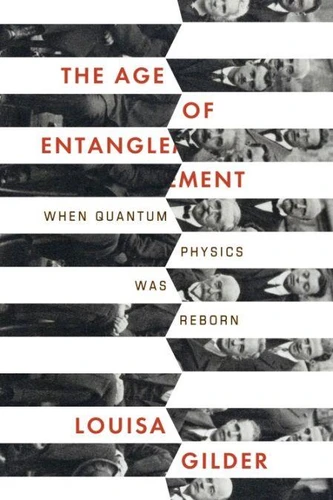The Age of Entanglement
Par :Formats :
Disponible dans votre compte client Decitre ou Furet du Nord dès validation de votre commande. Le format ePub protégé est :
- Compatible avec une lecture sur My Vivlio (smartphone, tablette, ordinateur)
- Compatible avec une lecture sur liseuses Vivlio
- Pour les liseuses autres que Vivlio, vous devez utiliser le logiciel Adobe Digital Edition. Non compatible avec la lecture sur les liseuses Kindle, Remarkable et Sony
- Non compatible avec un achat hors France métropolitaine
 , qui est-ce ?
, qui est-ce ?Notre partenaire de plateforme de lecture numérique où vous retrouverez l'ensemble de vos ebooks gratuitement
Pour en savoir plus sur nos ebooks, consultez notre aide en ligne ici
- Nombre de pages352
- FormatePub
- ISBN978-0-307-27036-8
- EAN9780307270368
- Date de parution11/11/2008
- Protection num.Adobe DRM
- Taille2 Mo
- Infos supplémentairesepub
- ÉditeurVintage
Résumé
In The Age of Entanglement, Louisa Gilder brings to life one of the pivotal debates in twentieth century physics. In 1935, Albert Einstein famously showed that, according to the quantum theory, separated particles could act as if intimately connected-a phenomenon which he derisively described as "spooky action at a distance." In that same year, Erwin Schrödinger christened this correlation "entanglement." Yet its existence was mostly ignored until 1964, when the Irish physicist John Bell demonstrated just how strange this entanglement really was.
Drawing on the papers, letters, and memoirs of the twentieth century's greatest physicists, Gilder both humanizes and dramatizes the story by employing the scientists' own words in imagined face-to-face dialogues. The result is a richly illuminating exploration of one of the most exciting concepts of quantum physics.
Drawing on the papers, letters, and memoirs of the twentieth century's greatest physicists, Gilder both humanizes and dramatizes the story by employing the scientists' own words in imagined face-to-face dialogues. The result is a richly illuminating exploration of one of the most exciting concepts of quantum physics.
In The Age of Entanglement, Louisa Gilder brings to life one of the pivotal debates in twentieth century physics. In 1935, Albert Einstein famously showed that, according to the quantum theory, separated particles could act as if intimately connected-a phenomenon which he derisively described as "spooky action at a distance." In that same year, Erwin Schrödinger christened this correlation "entanglement." Yet its existence was mostly ignored until 1964, when the Irish physicist John Bell demonstrated just how strange this entanglement really was.
Drawing on the papers, letters, and memoirs of the twentieth century's greatest physicists, Gilder both humanizes and dramatizes the story by employing the scientists' own words in imagined face-to-face dialogues. The result is a richly illuminating exploration of one of the most exciting concepts of quantum physics.
Drawing on the papers, letters, and memoirs of the twentieth century's greatest physicists, Gilder both humanizes and dramatizes the story by employing the scientists' own words in imagined face-to-face dialogues. The result is a richly illuminating exploration of one of the most exciting concepts of quantum physics.



